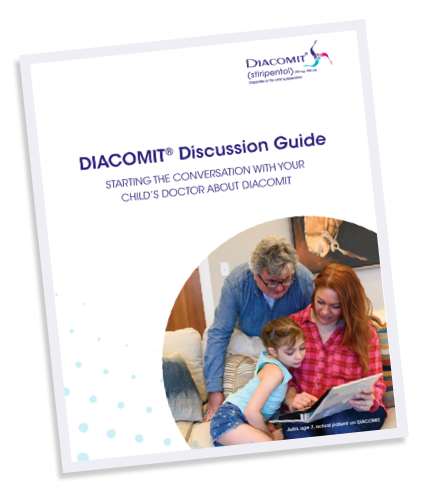
About DIACOMIT
DIACOMIT® (stiripentol) is an FDA-approved antiseizure medication developed specifically for seizures associated with Dravet syndrome in children as young as 6 months (weighing 15 pounds or more) and taking clobazam. There are no clinical data to support the use of DIACOMIT alone to treat Dravet syndrome.1
What is DIACOMIT (stiripentol)?
DIACOMIT is a unique antiseizure medication that was developed by Biocodex in the 1990s. It is thought to work by reducing abnormal excitement activities in the brain and by making clobazam last longer.1,38,50 Your child’s doctor may recognize or refer to DIACOMIT by its generic name, stiripentol. That’s because DIACOMIT was referred to as stiripentol when it was approved for compassionate use in the United States in 2000.
In 2018, DIACOMIT was granted FDA approval for children 2 years and older, and in 2022, DIACOMIT’s indication was expanded to include children as young as 6 months weighing 15 pounds or more.1,9,10,15
The DIACOMIT Difference
Treat Seizures Sooner
Most children with Dravet experience their first seizure by 6 months old.49 Before 2022, children under age 2 did not have a Dravet-specific treatment option. Now, you don’t have to wait!
DIACOMIT is the only FDA-approved antiseizure medication for seizures associated with Dravet syndrome in children as young as 6 months.*1
Achieve Profound Seizure Reduction
DIACOMIT has clinically demonstrated efficacy in managing seizures associated with Dravet syndrome and is proven to control clonic and tonic-clonic seizures.1,2,16
Review the study results below.
Results may vary.
Trust in Proven Experience
DIACOMIT has nearly three decades of real-world use.7,36,37,51 As of 2022, Biocodex has made it available to patients with Dravet syndrome in more than 35 countries.40

Access Treatment Quickly
Our national specialty pharmacy partner has streamlined the fulfillment process and can deliver DIACOMIT directly to your patient’s door in as little as one week.
Read more about Accessing DIACOMIT.
Want More, Expect More
It can be nerve-wracking to change your child’s treatment plan, but if you’re not seeing the results you want, it’s okay to ask for more. When it comes to Dravet syndrome, you don’t have to settle. Your child deserves more time celebrating everyday wins.

“The demonstrated efficacy of these ‘DS-specific’ medications strongly supports their use earlier in the treatment paradigm…we should redefine our expectations of seizure control, and no longer accept seizures every 1 to 2 months as the best we can do.”53
International Consensus on Diagnosis and Management of Dravet Syndrome (2022)
Results with DIACOMIT may vary
There are no known contraindications when combining DIACOMIT with other antiseizure medications. Dose adjustments for other antiseizure medications may be required. Clinical discretion is advised, as individual patient considerations may vary when managing antiseizure medication regimens.


Complete the Caregiver DIACOMIT Discussion Guide
Review talking points to help you start the conversation about DIACOMIT with your child’s doctor. Your child deserves a Dravet-specific antiseizure treatment.
Profound Seizure Reduction Backed by Results
In two randomized, placebo-controlled clinical trials, patients with Dravet syndrome on DIACOMIT experienced significantly fewer clonic or tonic-clonic seizures than those on placebo.1,2 About 74% of patients experienced a 50% or greater reduction in seizures in the second month of the study compared with before treatment. More than half of patients experienced a 75% or greater reduction in seizures, with nearly 39% of patients becoming seizure-free during the two-month study period.1,2,6
Clinical Studies Pooled Results
Main Objective: Responder Rate*
*Response was defined as experiencing a greater than 50% decrease in the frequency of generalized clonic or tonic-clonic seizures.
Safety in the Clinical Trials
During the studies, the most common side effects, occurring in 10% or more of patients on DIACOMIT and more frequently than placebo, were:1
- Sleepiness (67%)
- Decreased appetite (45%)
- Agitation (27%)
- Impaired coordination (27%)
- Decreased weight (27%)
- Decreased muscle tone (24%)
- Nausea (15%)
- Tremor (15%)
- Slurred speech (12%)
- Insomnia (12%)
Across five other studies, side effects in children with Dravet syndrome who were 6 months to less than 2 years of age were similar to those seen in the pivotal studies. Stiripentol has been studied for more than three decades, resulting in data that support a track record of safety.7,36,37,51
Most side effects of DIACOMIT are predictable and manageable. For example, if your child is feeling more tired or less hungry than usual, talk to their doctor. Your child’s doctor may decide to adjust the dose of certain comedications. Visit Starting DIACOMIT to read more.
Clinical Trials Descriptions
DIACOMIT (stiripentol) was tested in two clinical trials, STICLO France and STICLO Italy. In both studies, patients were randomly split into two groups: one group on stiripentol (with clobazam and valproate) and one group on placebo (with clobazam and valproate).1,5
Together, the studies included 56 patients with Dravet syndrome from 3 to 18 years old with inadequately controlled seizures. Researchers measured the response to treatment, or how many patients experienced a 50% or greater reduction in seizures in the second month of the treatment period.6,7 Including both studies, 74% of patients experienced a 50% or more reduction in generalized clonic or tonic-clonic seizures in the second month compared with baseline and nearly 39% of patients became seizure-free for at least eight weeks.1,5,6
Ready to make the DIACOMITment?
Understand the convenient dosing options.
Hear From Caregivers
Caregivers of children with Dravet share their experiences with DIACOMIT.

